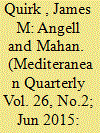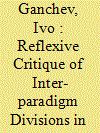| Srl | Item |
| 1 |
ID:
139376


|
|
|
|
|
| Summary/Abstract |
Norman Angell and Alfred Thayer Mahan were two of the leading thinkers on pre–World War I “interdependence,” offering competing lessons on the changes in technology, economics, and security. At different times during the twentieth century, each one’s ideas seemed to best explain global politics and strategy. This essay reconsiders their ideas in the current era of globalization and global threats.
|
|
|
|
|
|
|
|
|
|
|
|
|
|
|
|
| 2 |
ID:
185640


|
|
|
|
|
| Summary/Abstract |
This article begins by re-opening the Third Great Debate which established division lines between mainstream (realist/liberal/constructivist) and Critical (neo-Marxist/neo-Gramscian) theories of International Relations based on their different assumptions about the nature of the international system: anarchy and hierarchy, respectively. The first half of the article argues that adopting common definitions of these concepts makes the anarchy–hierarchy debate theoretically irresolvable and further demonstrates that mainstream and Critical theories do not share an understanding of these terms neither between, nor within, their own traditions. The second half of this article challenges and aims to correct the interpretation of three key political thinkers, Halford J. Mackinder, W. E. B. DuBois and Norman Angell as appropriated within the inter-paradigm debates of International Relations. It argues that the respective associations of these thinkers with early realism, critical theories and early liberalism are intellectually misguiding because their works exhibit a common understanding of the ‘international’ across macro- and micro-dimensions, which is uncharacteristic of ‘-isms’. This shows that popular interpretations of pre-1919 works through post-1919 paradigms can obscure more than they reveal. These findings do not seek to present new ideas but to produce a reflexive critique of IR which illuminates some, perhaps unintended, counter-productive systemic effects that inter-paradigm divisions can have on the discipline.
|
|
|
|
|
|
|
|
|
|
|
|
|
|
|
|